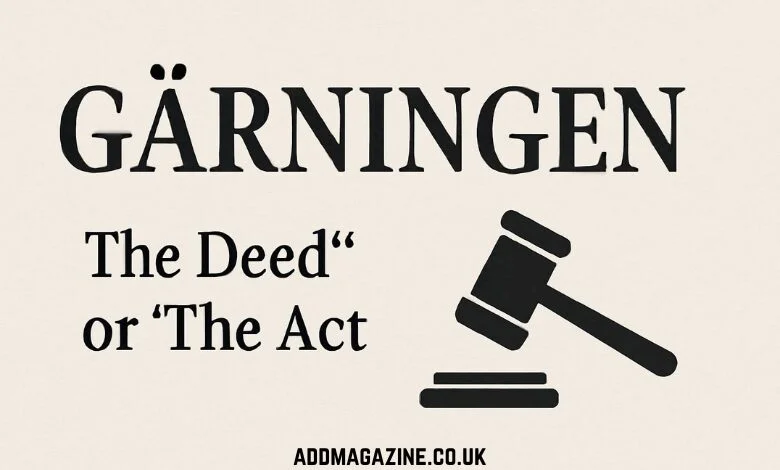Gärningen: Exploring Meaning, Context, and Significance

Language is full of unique expressions that carry layers of meaning. One such intriguing word is gärningen a term that often sparks curiosity due to its complex structure and usage. At first glance, it may appear repetitive, but within linguistic traditions, repetition often adds emphasis, depth, and cultural weight.
In this article, we will explore the background, interpretations, and broader significance of gärningen examining how it functions within language, thought, and even philosophical discussions.
Understanding the Word Gärningen
The core of lies in the root which in many contexts refers to a deed, act, or work. By repeating and extending the word, the expression takes on a heightened emphasis. It suggests not just any deed, but the very essence of the deed itself.
This layered meaning makes it more than a literal phrase. Instead, it can be seen as a way of pointing toward the central or ultimate action, almost like saying “the deed of all deeds.”
Linguistic Roots of Gärningen
Language scholars often view words like as examples of intensified expression. In Scandinavian linguistic traditions, repetition can highlight importance.
-
“Gärning” = deed or act.
-
“Gärningen” = the deed (definite form).
-
“Gärningen” = the ultimate deed, or the act that defines other acts.
Through this evolution, the word moves from a simple description to a deeper, almost philosophical statement.
Cultural Context of Gärningen
Culture often shapes how words develop meaning. In literature and spiritual texts, gärningen may symbolize the most important act in a narrative or belief system. For example, in religious or moral discussions, it can represent the defining action that changes everything — a turning point deed.
Writers sometimes use this layered word to underline responsibility, morality, or destiny. Its rhythm and repetition also give it a poetic tone, which is why it finds a place in both academic and artistic contexts.
Symbolic Significance of Gärningen
Beyond linguistics and culture, gärningen carries symbolic power. It often implies:
-
Finality – the ultimate deed that concludes a process.
-
Essence – capturing the true meaning of an act.
-
Impact – emphasizing the weight of a decision or action.
This is why it resonates in philosophy, where actions are not only physical deeds but reflections of values, choices, and consequences.
Gärningen in Philosophy and Ethics
Philosophers often debate the meaning of actions, and fits naturally into such conversations. It suggests that not all actions are equal — some stand out as central to moral identity or ethical consequence.
For instance, when we say “the deed of deeds,” we may be pointing toward:
-
A sacrifice that changes history.
-
A betrayal that alters trust forever.
-
A moment of courage that defines a lifetime.
In this sense, reminds us that one action can outweigh many smaller ones.
Everyday Interpretation
While the word can sound lofty, it also applies to everyday life. Think about milestones that shape personal identity — graduation, marriage, parenthood, or career achievements. Each of these can be considered a personal , marking the defining deed in someone’s journey.
On a societal scale, groundbreaking discoveries, political reforms, or cultural movements can also be described with the same emphasis.
Literary Use of Gärningen
In literature, repetition and rhythm often enhance meaning. Authors who use usually aim to stress the central importance of an action. It works almost like a drumbeat, echoing the weight of the moment.
For poets and novelists, this kind of word is invaluable. It not only conveys meaning but also creates a dramatic tone that resonates with readers.
Psychological Perspective
From a psychological viewpoint, may represent how humans perceive certain actions as more meaningful than others. We often remember defining deeds — the good or bad moments that leave permanent marks.
-
In therapy, discussing one’s “defining deed” helps uncover deep motivations.
-
In personal growth, recognizing allows individuals to focus on transformative actions.
This highlights how language can shape thought, giving us tools to identify what matters most.
Gärningen and Modern Relevance
Even in today’s fast-moving digital world, the idea behind remains relevant. We live in an era of constant activity, but only a few actions truly define our paths. Whether it’s launching a business, standing up for justice, or making a personal breakthrough, these moments stand out as ultimate deeds.
Social media often amplifies this effect. Viral acts — whether of kindness, bravery, or creativity — become global , remembered far beyond the moment they happened.
Conclusion:
At its core,is more than just a word. It is a concept that captures the power of defining deeds. From its linguistic roots to its cultural, philosophical, and psychological significance, it reminds us that some actions carry extraordinary weight.
By recognizing our own , we can reflect on what truly defines our lives and how our deeds shape the world around us.




